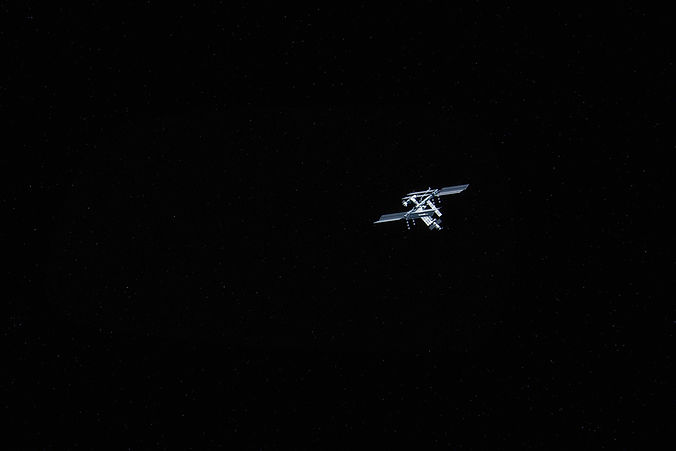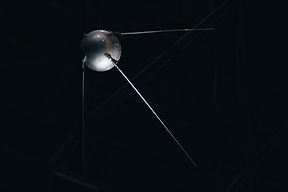

The Origins of Primary Space Law
A Comprehensive Overview of the Historical Events, Treaties, and Institutions that Shaped the Legal Framework for Governing Outer Space Activities and International Cooperation
Timeline
1957
THE LAUNCH OF SPUTNIK
Sputnik Launch (1957): The Soviet Union's successful launch of Sputnik 1, the first artificial satellite, marks the beginning of the Space Age and sets the stage for the development of space law, as nations realize the need for legal frameworks to govern outer space activities.

1963
THE DECLARATION
1963: Declaration of Legal Principles - The UN General Assembly adopts the "Declaration of Legal Principles Governing the Activities of States in the Exploration and Use of Outer Space," outlining foundational guidelines for space activities and shaping the direction of future space law treaties. It emphasized international cooperation and the peaceful use of outer space for the benefit of all mankind.

1955
1959
THE CREATION OF THE C.O.P.U.O.S.
COPUOS Formation (1959): The United Nations establishes the Committee on the Peaceful Uses of Outer Space (COPUOS) to promote international cooperation in the exploration and use of outer space for peaceful purposes and to develop legal frameworks for space activities, ensuring the benefit of all mankind.

1966
THE SPACE TREATY
Outer Space Treaty (1967): The Treaty on Principles Governing the Activities of States in the Exploration and Use of Outer Space, including the Moon and Other Celestial Bodies, establishes the key legal framework for space activities, emphasizing peaceful use, international cooperation, and prohibiting the appropriation of celestial bodies.

The Launch of Sputnik 1
The launch of Sputnik in 1957 heralded a new era in human history, marking the beginning of the space age and forever changing our perception of the world and the cosmos. This groundbreaking achievement by the Soviet Union not only demonstrated the technical prowess required for space exploration but also emphasized the need for governance and legal order beyond Earth.
Before the launch of Sputnik, the concept of space exploration was largely limited to the realm of science fiction and speculation. However, with the successful launch of the first artificial satellite, it became clear that space exploration was now a reality, and the subsequent international concerns regarding the use and exploration of outer space prompted urgent discussions on the development of legal frameworks to address these challenges.
The launch of Sputnik served as the catalyst for the establishment of key institutions such as the Committee on the Peaceful Uses of Outer Space (COPUOS) and the UN Office of Outer Space Affairs (UNOOSA), which have played a vital role in ensuring the peaceful use of outer space and the promotion of international cooperation in space activities. The post-Sputnik era has been characterized by remarkable achievements in space exploration, as well as the ongoing development of space law that seeks to address the unique challenges and opportunities presented by this new frontier.
The Committee on the Peaceful Uses of Outer Space
The establishment of the Committee on the Peaceful Uses of Outer Space (COPUOS) and the UN Office of Outer Space Affairs (UNOOSA) signified a crucial step in the development of legal frameworks and governance for space activities. In response to the launch of Sputnik and the dawn of the space age, the United Nations recognized the necessity of addressing the legal and governance challenges presented by the exploration and use of outer space.
COPUOS, created in 1959, serves as the primary forum within the United Nations for discussions and negotiations on the peaceful use of outer space. It promotes international cooperation in the exploration and use of outer space and seeks to develop legal frameworks to ensure that space activities are conducted for the benefit of all mankind. COPUOS operates on the foundation of six guiding principles, which include recognizing the common interest of humanity in the peaceful use of outer space and the importance of international cooperation in achieving this goal.
UNOOSA, acting as an advisory body under the UN Secretariat, supports the work of COPUOS and plays an essential role in facilitating the development of international space law. The UNOOSA provides technical assistance, information, and expertise to member states and promotes cooperation in space activities to help achieve the objectives laid out by COPUOS.
Together, COPUOS and UNOOSA have paved the way for the creation of the foundational legal documents of space law, including the five major international treaties that govern outer space activities. Their work has been instrumental in promoting the peaceful use of outer space and fostering international cooperation in this rapidly evolving domain.
The Declaration of Legal Principles Governing the Activities of States in the Exploration and Use of Outer Space
Sputnik was the inciting incident; however, the 60s brought the need for law in outer space to the forefront of public policy. With Kennedy’s speech to congress and later at Rice University, The goalposts were officially set on the lunar regolith. With that, the immense possibilities and uncertainties that humankind on the moon presented our legal and governmental institutions were brought into the academic and professional discourse. Concurrently, the UN was developing the groundwork for law in space. In late 1963, the UN general assembly passed resolution 1962(XVII), the “Declaration of Legal Principles Governing the Activities of States in the Exploration and Use of Outer Space.”. This document outlines the general legal foundation for all space law to follow; it is the culmination of the previous half-decade of development within the COPUOS and the UNOOSA as well as resolutions 1721(XVI) and 1802(XVII), the former recognizing the principle of terra nullius (which we explore in depth in this article) as well as encouraging registration with the UN of all objects launched into space to establish a public registry, promoting cooperation between nation states in scientific and meteorological research, as well as the development of space-based communications systems, noting the plan of the international telecommunications union (ITU) to meet on this subject matter the following year (an article discussing this can be found here). The latter resolution consists of reaffirmations of the former resolution as well as encouraging the ITU to report to the COPUOS the results of the convention planned the following year.
The Declaration of Legal Principles Governing The Legal Activities of States in the Exploration and Use of Outer Space, further referred to as “The Declaration,” is a summation in 9 points, the legal principles developed by the COPUOS and expressed in the aforementioned resolutions.
-
Point 1 declares the exploration of outer space a pursuit for the benefit of all mankind.
-
Points 2 and 3 declare terra nullius of outer space and celestial bodies that the exploration of space ought to be an endeavor pursued equally by any nation willing and that objects in outer space are not to be declared the property of any nation.
-
Point 4 declares that activities in space exploration by nation-states must be conducted in accordance with international law[, in the interest of maintaining peace and security and encouraging international cooperation.
-
Point 5 declares that states bear the sole international responsibility for all actions carried out in outer space, whether conducted by a governmental or non-governmental agency, mandating the authorization of outer space activities carried out by non-governmental agencies from the state in which they are going to be carried out.
-
Point 6 declares that in the exploration and use of outer space, states must abide by the principles of cooperation and mutual aid and must not conduct activities that may cause interference or harm to another nation-state’s activities in outer space.
-
Point 7 declares that the state of origin of any objects or personnel launched into space maintains jurisdiction over the objects or persons in question and maintains jurisdiction upon the return from outer space. If, on return, the objects or persons are found outside the origin nation-state, they must be returned to the origin nation-state upon identification.
-
Point 8 declares that the state from which an object or person is launched is liable for any damage caused by the object/person.
-
Point 9 declares that astronauts, regarded as envoys of all mankind, shall be rendered all reasonable and possible aid by any nation-state in the event of accident, emergency, or distress.
The Declaration's nine principles, which serve as the foundation for international space law, were later expanded upon and refined through the development of treaties, agreements, and conventions that govern space activities today. The most significant of these legal documents is The Treaty on Principles Governing the Activities of States in Exploration and Use of Outer Space, Including the Moon and Other Celestial Bodies, which was adopted in 1967. This treaty builds upon the principles outlined in the Declaration and further establishes the legal framework for peaceful exploration and use of outer space. In the next section, we will explore the content and significance of this treaty in more detail.